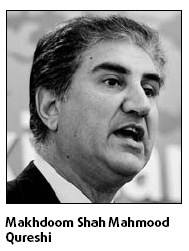Asia-Pacific
Pakistan offers peace talks to Taliban
(China Daily)
Updated: 2010-02-24 07:43
 |
Large Medium Small |
Chinese experts believe that "talks are easier said than done"
Pakistan has called for peace talks with the Taliban within its territory after heavy military operations that have hit the Taliban hard.
Islamabad's offer came just two days after the Afghan Taliban rejected a similar appeal for peace talks by Afghan President Hamid Karzai.

Makhdoom Shah Mahmood Qureshi, Pakistan's foreign minister said in Beijing yesterday that military force is not the only solution to terrorism.
"We've never said 'no' to dialogue," Qureshi, 53, said, addressing the China Institute of International Studies (CIIS), adding the problem is "who to have dialogue with".
He said poverty, deprivation, and low literacy are the origins of terrorism. The problem could be addressed "if they are given alternatives", Qureshi said in yesterday's speech -- "Pakistan's Challenges and Our Responses".
The speech stressed that Islamabad would continue its counter-terrorism strategy based on "three Ds": Development, Dialogue, and Deterrence.
However, Chinese analysts are pessimistic about the possibility of talks with the Taliban.
"Talks are easier said than done," said Ye Hailin, an Asian studies expert at the Chinese Academy of Social Sciences. He said the Afghan Taliban, which has always been "xenophobic", is firmly against talks with foreign forces and the government they back.
| ||||
"Karzai is a puppet. He cannot represent a nation or a government," said Taliban spokesman Qari Mohammad Yousuf, according to Reuters. "He is bogged down in corruption and is surrounded by warlords who are making themselves rich."
Even in Pakistan, where there are some grounds for talks with the local Taliban, Ye said such dialogue is unlikely to achieve any concrete outcome. What Islamabad demands from the Taliban in Pakistan is for them to abandon terror attacks and to stop receiving foreign militants and the latter condition is unlikely to be met, he said.
"It's a matter of money. When foreign militants cross into Pakistan, they always have large amounts of money," Ye explained, adding it's physically impossible to seal off the border between Pakistan and Afghanistan, which is about 2,500-km long.
Pakistan has increased military posts along the Afghan border in Balochistan Province to keep a watch over Taliban infiltrating in the wake of a NATO military offensive in Marjah, southern Afghanistan, and has caught about 200 Taliban militants fleeing from the battlefield.
Meanwhile, reports said police in northwest Pakistan have arrested Mulvi Kabir, one of the top 10 most wanted Taliban leaders.
Despite these successes, the Taliban in Pakistan are still unlikely to accept Qureshi's offer for peace talks, said Dong Manyuan, an anti-terror expert at CIIS.
"The Taliban have a strong social foundation (in Pakistan's terror-affected regions)," Dong said. Even with the death of its leaders, Baitullah Mehsud and Hakimullah Mehsud, support for the Taliban remains, especially in those impoverished regions where people lack alternatives, he said.










